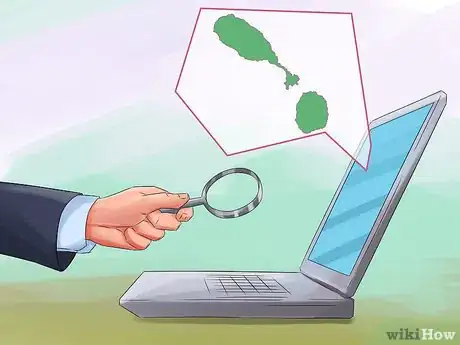This article was co-authored by Clinton M. Sandvick, JD, PhD. Clinton M. Sandvick worked as a civil litigator in California for over 7 years. He received his JD from the University of Wisconsin-Madison in 1998 and his PhD in American History from the University of Oregon in 2013.
There are 14 references cited in this article, which can be found at the bottom of the page.
This article has been viewed 14,380 times.
In broad terms, an offshore company is one that is formed in a country other than the owner’s residence. The term “offshore” can technically refer to any country, but it is mostly associated with certain countries, or jurisdictions, where the local laws offer asset protection, business flexibility, tax minimization and privacy protection. Forming an offshore company begins with choosing a business structure and jurisdiction. Then, the business owners must appoint a registered agent or trustee, incorporate the company and fulfill all financial reporting responsibilities.
Steps
Preparing to Form an Offshore Company
-
1Understand the benefits of forming an offshore company. Depending on the type of company you form and the location you choose, incorporating in an offshore jurisdiction can significantly reduce or eliminate corporate taxes. Also, many offshore jurisdictions offer privacy, flexibility with business structures and minimal financial reporting requirements.
- Technically, the term “offshore” refers to managing, registering and conducting a business in a country other than where you reside. However, it typically refers to doing business in a location where you can expect to receive reduced taxes and increased privacy.
- Popular locations for offshore companies include British Virgin Islands, Gibraltar, Anguilla, Panama, Hong Kong, Uruguay, Cayman Islands and Bermuda.
- If your company is large enough, the benefits can be considerable. The clothing design company Michael Kors saved millions in tax and regulatory fees by incorporating in the British Virgin Islands. Stanley Tool Works estimated that they would save $30 million per year by incorporating abroad.[1]
-
2Hire an offshore service provider (OSP). An OSP registers and incorporates your offshore company. They handle administrative tasks, such as completing any required financial reports and annual renewal documents and acting as an intermediary between the owner of the company and the local government and the owner of the company, They also provide a registered address and a registered agent for the company.[2]
- A registered agent is a third-party who is responsible for receiving documents and legal notices on behalf of the business. The registered agent must reside in the jurisdiction and their address must be provided with the articles of incorporation.[3]
- You can choose either a specialized or a universal OSP.
- A specialized OSP specializes in one particular location. They are physically located in that jurisdiction and are licensed as Registered Agents in by local regulatory authorities.[4]
- A universal OSP sells offshore companies in many jurisdictions. They are usually located in big cities like London, New York or Hong Kong. The connect with a Registered Agent in the locations where you want to form your company.[5]
- Unless you or one of your business partners is a national or has expatriated to one of the nations where you seek to incorporate, you will most likely want to hire a specialized OSP. They will be familiar with all of the legal ins and outs that accompany incorporation in the jurisdictions in which they operate, and they will know in advance all of the accompanying documentation and paperwork you will need to have.
Advertisement -
3Find a reputable OSP. Find out how long the firm you're looking at has been in business, and how long they have been in business in the jurisdiction where you seek to incorporate. If the OSP does not provide you with a physical location, they are likely not a reputable firm. Similarly, if they over promise free or inexpensive services or seem exceptionally inexpensive, then you should look elsewhere.[6]
-
4Prepare for the fees. Although many OSP's will do a basic incorporation for a few hundred dollars, there are associated fees for which you must plan. In order to take full advantage of offshore incorporation, you will want to set up an accompanying bank account in that jurisdiction, get corporate seals, logos, and corporate officers. These associated costs can increase the price significantly, into the low four figures. [7]
-
5Contact an attorney. If you are doing business overseas, it make sense to obtain local, experienced legal counsel. Your OSP will likely not be able to provide legal advice. An international corporate, tax or trade attorney will be able to guide you through the requirements of the jurisdiction in which you are doing business. Also, an attorney can coordinate services and provide you with timely information about new regulatory trends.[8]
- To find an international attorney, you can visit FindLaw, the International Lawyers Referral Directory or the ALFA member directory.
Choosing a Company Form
-
1Learn more about the structure of International Business Companies (IBC). Also called International Business Corporations, IBCs are the most common type of offshore business structure. An IBC can engage in international business activities such as trade or investment. The IBC remains exempt from local corporate taxation as long as it does not earn income in the country in which it is incorporated. In addition to minimal taxation, the benefits of IBC’s include rapid formation, banking and corporate privacy and minimal filing and reporting requirements.
- An IBC must have a minimum of one director and one shareholder, and they can be the same person. Therefore, offshore sole proprietorships are often incorporated as IBC’s.[9]
- IBCs can use a wide range of suffixes, depending on the jurisdiction in which they are located. Suffixes include Ltd, Limited, Inc, Incorporated, Corp., Corporation and S.A.[10]
-
2Decide to form a Private Limited Company. This is the second most common form of offshore company. This type of company offers limited liability to shareholders, and the shares are not publicly traded. Rather, they are held privately by the shareholders. These types of companies have different names and work differently depending on the jurisdiction in which they are formed.[11]
-
3Choose to form a Limited Liability Company (LLC). This type of company is not very common in offshore jurisdictions. LLC’s are a hybrid of corporations and partnerships. They offer owners the limited liability protection of a corporation. This means that owners cannot be held personally liable for losses of the business. But, since they have members instead of shareholders and directors, they are not taxed as corporations. Therefore, owners can claim income from the business on their personal taxes.[14]
- LLC’s can use different suffixes, depending on the jurisdiction in which they are located. Suffixes include SRL, SàRL and LLP.[15]
Choosing a Jurisdiction
-
1Contemplate your reasons for forming an offshore company to find the right location. If you do an internet search of “best offshore financial centers” or “best tax havens,” every article you read will name a different jurisdiction as the best location for your offshore company. This is because each business and business owner has different needs and different reasons for deciding to form an offshore company. Perhaps you want to minimize taxes or reduce the cost of doing business. Or, privacy might be your priority. Whatever reason is most important to you will drive the choice of offshore locations.
-
2Choose a location that accepts the company form you will use. If you are forming an IBC, many locations will allow you to incorporate in their country. However, if an LLC makes more sense for your business, your options may be somewhat limited. The corporate laws and business infrastructure of the jurisdiction dictates the kinds of companies you can form in a given location.[16]
-
3Estimate the incorporation costs. This is often the most important factor in choosing a location for an offshore company. If you are thinking about forming an offshore company, then a reduced cost of doing business is likely already important to you. Knowing the costs of incorporating in a jurisdiction will be part of your selection process.
- The jurisdictions that offer the lowest incorporation costs are Seychelles, Belize and Anguilla.
-
4Consider the popularity of the location. The most popular locations for offshore companies usually offer the best combination of tax benefits, reporting requirements, costs and flexibility. Look at locations where other businesses in your industry have formed offshore companies to see if they are a good fit for you. However, don’t rule out less popular locations. Just because a jurisdiction isn’t one of the more popular ones doesn’t mean that it wouldn’t be a good choice for your company.
- Some of the most popular jurisdictions for offshore companies include British Virgin Islands (BVI), Panama and Belize.
-
5Scrutinize the location’s reputation. This criteria is similar to popularity. However, it focuses more on the location’s standing within the professional community and among banks and government agencies. Factors that affect a jurisdiction’s reputation include the quality of its corporate laws and legislature and the stability of the local government.
- Locations with excellent reputations include Hong Kong, BVI and Belize.
-
6Investigate processing times. The amount of time it takes to complete the offshore company formation process in a desired location may be important to you. You may not want to wait weeks or months for a company to be registered or to receive original documents. In some locations, the processing time can be as little as 24 to 48 hours. Processing time depends on the stability of the local government and the effectiveness of your registered agent.
- Countries with effective processes that shorten processing time include Nevis, Anguilla and Seychelles.
-
7Learn about the availability of banking services. Depending on the type of business you conduct, the proximity of offshore banking facilities may be important to you. Countries with well-developed banking systems will have banks that offer you a variety of financial services. For example, you may want to work with a local bank to process offshore debit and credit cards or open a merchant account. In addition, you may want the flexibility of available online banking.
- Jurisdictions with proximity to offshore banking facilities include Belize, Seychelles and Anguilla.
-
8Learn whether the jurisdiction has signed any tax treaties that are relevant to your business. Tax treaties increase transparency, so they are usually a positive element that attract businesses. However, if you are more interested in privacy and confidentiality, the existence of tax treaties may make a jurisdiction less attractive to you.[19]
- To find out about tax treaties in an offshore jurisdiction, visit the Exchange of Information Portal of the Organisation for Economic Cooperation and Development (OECD).
- You can also visit the websites of the government authorities of the country where you live and the country in which you want to establish a company.
-
9Investigate the jurisdiction’s corporate tax rate. Don’t assume that the corporate tax rate is zero percent just because the location is considered a tax haven. Some offshore jurisdictions do impose some form of corporate taxes. To learn about corporate tax rates, visit KPMG’s list of worldwide corporate tax rates. For in-depth information about taxation, read Tax Highlights, which is published by Deloitte. You can also get information about corporate tax rates from the website of the local government.[20]
-
10Find out about requirements for resident directors or shareholders. Some countries require that at least one director or shareholder maintain a residence within the jurisdiction. Singapore, for example, requires that a company have at least one resident director. Needing resident directors or shareholders may increase the cost of business if you have to pay for someone to relocate. Other countries require a resident secretary, which may be less expensive. But if you don’t want to have to worry about paying for this, you may opt for an offshore jurisdiction that does not impose residency requirements.[21]
Incorporating Your Offshore Company
-
1Gather your documents. Keep in mind, the required documents are going to vary for each jurisdiction. Almost everyone who incorporates an offshore business will use an OSP to set up and file the corporate documents. These third parties may have their own requirements. However, there are certain documentary requisites you should expect anywhere.
-
2Prove your identity. The US has relatively lax identity verification requirements, so US citizens should prepare to provide more. Commonly accepted identification documents include passports and driver's licenses. Many OSP’s will ask for copies certified by notaries, banks, or lawyers. Most will accept the copy via email, although you should expect to provide unusually high quality scans.[22]
- You may also be asked to provide utility bills and bank statements in your name, both of which show the same address. These will be subject to the same types of certification to prove authenticity as identification documents. [23]
-
3Provide a detailed description of what your business activities will be. You'll need to explain what services you provide or goods you will trade. Even though you are incorporating the business offshore, you will need to provide the physical principal location of business. The OSP will also require information about where your suppliers and customers are located. [24]
-
4
References
- ↑ http://dealbook.nytimes.com/2011/12/20/the-benefits-of-incorporating-abroad-in-an-age-of-globalization/
- ↑ https://www.offshorebvi.com/offshore.company.providers/offshore.service.provider/
- ↑ https://www.offshore-protection.com/learn/offshore-glossary-terms/7-registered-agent
- ↑ https://www.offshorebvi.com/offshore.company.providers/offshore.service.provider/specialized-providers.php
- ↑ https://www.offshorebvi.com/offshore.company.providers/offshore.service.provider/universal-providers.php
- ↑ https://www.offshorebvi.com/offshore.company.providers/offshore.service.provider/
- ↑ http://blog.transparency.org/2013/04/09/how-to-set-up-an-offshore-company-in-10-minutes/
- ↑ http://www.alfainternational.com/international-law
- ↑ http://www.internationalman.com/articles/how-to-start-an-offshore-company
- ↑ http://www.internationalman.com/articles/how-to-start-an-offshore-company
- ↑ https://www.streber.org/2014/12/how-to-form-an-offshore-company/
- ↑ http://www.internationalman.com/articles/how-to-start-an-offshore-company
- ↑ http://www.internationalman.com/articles/how-to-start-an-offshore-company
- ↑ https://www.streber.org/2014/12/how-to-form-an-offshore-company/
- ↑ https://www.streber.org/2014/12/how-to-form-an-offshore-company/
- ↑ https://www.streber.org/2014/12/how-to-form-an-offshore-company/
- ↑ http://www.internationalman.com/articles/how-to-start-an-offshore-company
- ↑ http://www.internationalman.com/articles/how-to-start-an-offshore-company
- ↑ https://www.streber.org/2014/12/how-to-form-an-offshore-company/
- ↑ https://www.streber.org/2014/12/how-to-form-an-offshore-company/
- ↑ https://www.streber.org/2014/12/how-to-form-an-offshore-company/
- ↑ https://www.apintertrust.com/know_your_client.htm
- ↑ https://www.apintertrust.com/know_your_client.htm
- ↑ https://www.apintertrust.com/documents/business_description_form.pdf
- ↑ https://www.apintertrust.com/know_your_client.htm
- ↑ http://www.nytimes.com/2012/07/29/magazine/my-big-fat-belizean-singaporean-bank-account.html?_r=1&pagewanted=all
- ↑ https://www.offshorebvi.com/offshore.bvi.faq/company.ordering.pricing/address-proof.php









































































